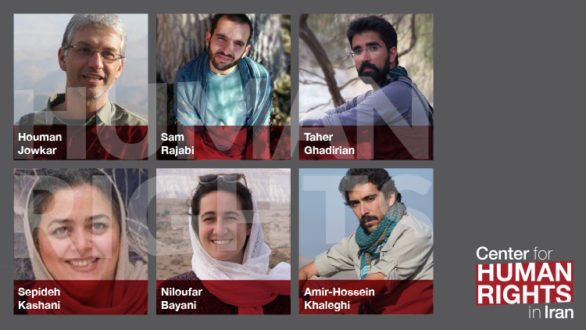CHRI – The head of Iran’s Department of Environment (DOE), Vice President Isa Kalantari, has publicly rejected claims by hardline judicial officials and media outlets that environmentalists detained in a crackdown by the Islamic Revolutionary Guard Corps (IRGC) engaged in espionage.
“It has been determined that these individuals were detained without doing anything,” Kalantari said while attending a conference in Tehran on May 22, 2018. “The Intelligence Ministry has concluded that there is no evidence that these individuals were spies.”
“The government’s fact-finding commission has concluded that the detained activists should be released because there’s no evidence to prove the accusations leveled against these individuals,” he added.
The Intelligence Ministry operates under President Hassan Rouhani while the IRGC, an elite force of the Iranian military, answers only to Supreme Leader Ali Khamenei.
The IRGC’s Intelligence Organization has arrested dozens of environmentalists in Iran since January 2018 in a widening crackdown on non-governmental organizations (NGOs) throughout the country.
The IRGC’s intelligence wing became an official state organization by order of the supreme leader in 2009 and has operated in parallel with the objectives of the Intelligence Ministry without governmental oversight.
The detained environmentalists include 15 former and current staff members of the Persian Heritage Wildlife Foundation (PHWF), whose managing director, Iranian Canadian academic Kavous Seyed-Emami, died under suspicious circumstances in Iran’s Evin Prison in February.
Rouhani announced that he had assembled a fact-finding commission in February after the death of Seyed-Emami and the deaths in custody of two young men arrested in Iran’s December 2017/January 2018 protests made international headlines.
Comprised of the ministers of the interior, intelligence and justice as well as the vice president for legal affairs, the commission has not made its findings public.
The Iranian government has ignored calls by Seyed-Emami’s family and UN officials for an independent investigation into his death, which was ruled a suicide prison and judicial officials before there was an autopsy.
The authorities have refused to release the names of and charges against the more than 40other environmentalists and their associates who were arrested in the southern province of Hormozgan in early May.
On May 8, Member of Parliament Mahmoud Sadeghi tweeted that the Intelligence Ministry’s counter-intelligence experts “had found no evidence at all of their [the environmentalist’ alleged] ties to espionage.”
The IRGC has made no comment on the detentions but in February Tehran Prosecutor Abbas Jafari Dowlatabadi accused the environmentalists of providing information about Iran’s missile sites to American and Israeli intelligence agencies.
According to the opposition news site Kalame, the environmentalists were targeted by the IRGC for opposing the installation of missile sites on protected lands.
“Kalame has received information that the environmental activists are not spies but in fact had resisted the IRGC’s excessive demands to encroach on environmentally protected regions for the installation of missile sites,” Kalame reported on April 16.
The report continued: “Although these regions were registered in the United Nations as protected areas, the IRGC thought it could build military sites there without any problem, thus it went ahead with installing missile silos and equipment. The move met opposition from environmental groups that repeatedly asked the IRGC to evacuate. The groups made it clear that the IRGC was endangering their activities to collect information and take photos of animals and plants for the UN. But the IRGC did not agree and asked these groups to instead submit old photos in their annual reports to the UN. The conflict between the two sides went on for years and eventually, the IRGC’s Intelligence Organization used espionage as an excuse to arrest the environmentalists so that it could continue its activities in the protected regions without any problem.”
The PHWF members who were arrested in January include Sam Rajabi, Niloufar Bayani, Morad Tahbaz (also holds American citizenship), Amir Hossein Khaleghi, Taher Ghadirian, Houman Jowkar and Sepideh Kashani.
In February, six environmentalists were arrested in the southern Iranian port city of Bandar Abbas and have been identified as Morteza Arianejad, Hassan Ragh, Abdolreza Kouhpayeh, Alireza Farhadzadeh and Aref and Hassan Zare (brothers).
The detainees have been denied access to counsel and have only had limited and brief contact with their family.
President Rouhani has not responded to a letter by 800 Iranian environmentalists demanding clarification on the “fate” of the environmentalists.
In April, Kalantari praised the former deputy head of the DOE, Kaveh Madani, after he left his position and Iran after being arrested by the IRGC’s Intelligence Organization.
Madani was also accused of espionage by hardline media outlets. In his resignation letter, Madani, a Western-educated water management expert, said he was subjected to state surveillance from the moment he returned to Iran to join the DOE.
 Shabtabnews In this dark night, I have lost my way – Arise from a corner, oh you the star of guidance.
Shabtabnews In this dark night, I have lost my way – Arise from a corner, oh you the star of guidance.



